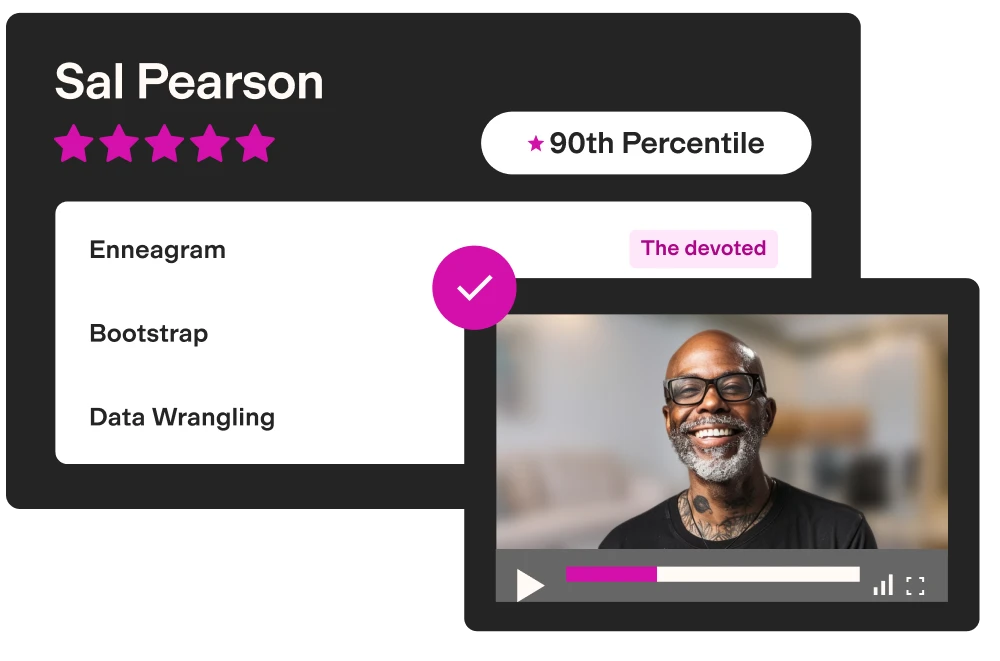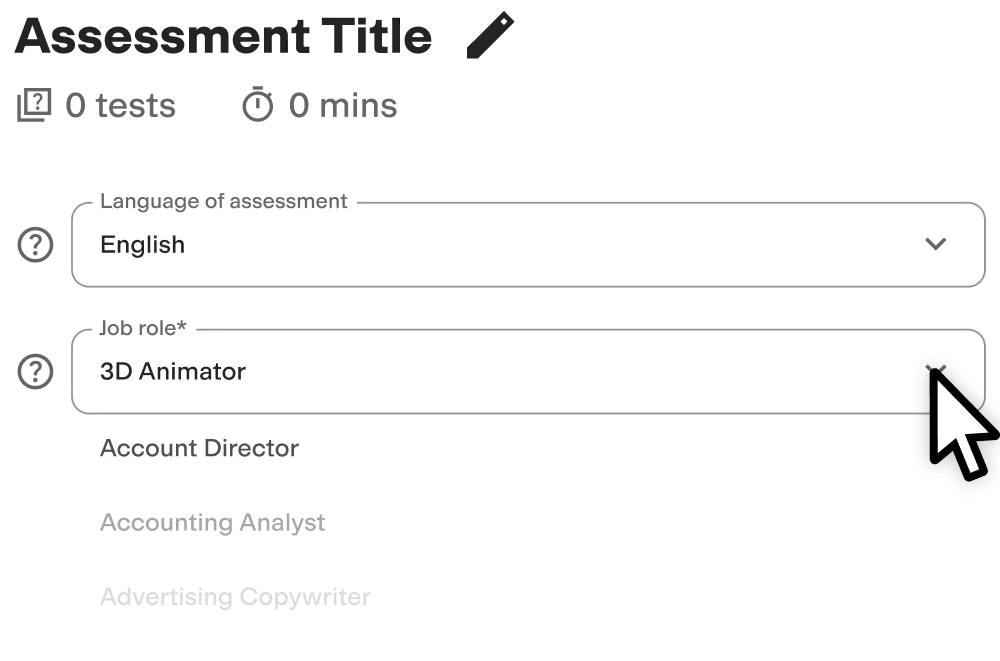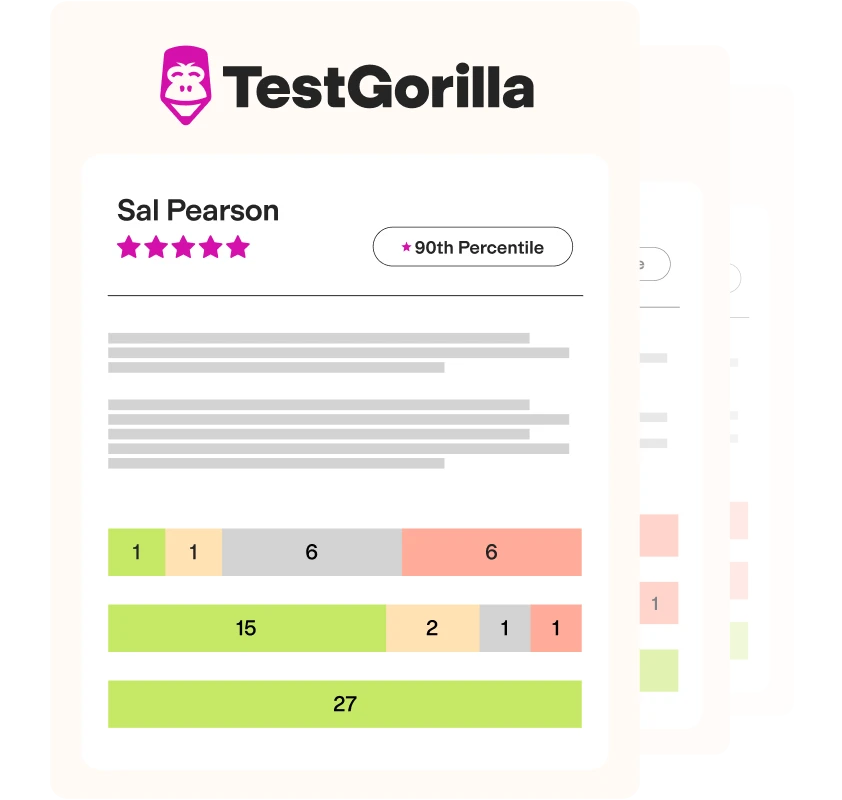Spanish B1 (Intermediate) test
Summary of the Spanish B1 (Intermediate) test
The Spanish B1 (Intermediate) test evaluates a candidate’s Spanish proficiency at the B1 level of the CEFR framework. This test will help you hire employees who can communicate in Spanish on subjects commonly encountered at work and in everyday life.
Covered skills
Basic grammar
Vocabulary and spelling
Reading comprehension
Listening comprehension
Use the Spanish B1 (Intermediate) test to hire
Customer support agents, sales representatives, and other employees that need an intermediate level of Spanish to perform well in their roles.
About the Spanish B1 (Intermediate) test
Employees with the ability to communicate in Spanish at the intermediate level will help improve your company’s internal and external communications by removing language barriers and improving the flow of information and collaboration among colleagues and to and from customers.
The Spanish B1 (Intermediate) test evaluates a candidate’s ability to communicate at the B1 level of the Common European Framework of Reference (CEFR) for Languages. The test evaluates candidates in the areas of grammar and vocabulary, sentence composition, reading comprehension, and listening comprehension.
Employees who can speak the Spanish language at an intermediate level can communicate with customers, colleagues, and other stakeholders comfortably around daily situations that can arise in the workplace.
The texts and sentences used in the test mimic real-life situations at work and everyday life. Those who score well on this test will be able to understand simple, connected sentences on topics that are generally familiar.
The test is made by a subject-matter expert
TestGorilla’s tests are created by subject matter experts. We assess potential subject-matter experts based on their knowledge, ability, and reputation.Before being published, each test is peer-reviewed by another expert, then calibrated using hundreds of test takers with relevant experience in the subject.
Our feedback mechanisms and unique algorithms allow our subject-matter experts to constantly improve their tests.
Mateo A.
Native Spanish-speaker Mateo wears many linguistic hats: test developer, ESL teacher, linguist, and translator of Portuguese and English to Spanish. Mateo has lent his expertise to various projects, including phonetic and conversational transcription, grammar analysis, and proofreading, and has been involved in the development of Spanish text-to-speech and speech recognition software.
On top of his penchant for languages, Mateo skills in blog publishing and management, particularly WordPress.
Use TestGorilla to hire the best faster, easier and bias-free
Our screening tests identify the best candidates and make your hiring decisions faster, easier, and bias-free.
Create high-quality assessments, fast
Building assessments is a breeze with TestGorilla. Get started with these simple steps.
What is a Spanish B1 test?
The Spanish B1 (Intermediate) test will help you evaluate your candidates’ knowledge of the Spanish language. The B1 in the Spanish B1 test stands for the level of knowledge of the Spanish language, according to the CEFR framework (we will talk about the CEFR framework a bit later).
When you need a candidate who speaks the Spanish language proficiently, you should give a Spanish B1 test to your applicants to evaluate if they have the necessary skills to perform in the role.
Hiring a good Spanish speaker is essential if your business operates in Latin America, if you need a customer-service representative because you sell products in Spanish-speaking countries, or if you’re trying to break into a new market that’s predominantly Spanish-speaking.
What does the Spanish B1 test measure?
When it comes to this intermediate Spanish test, we cover four areas of the language:
• Reading: Reading measures how well your candidates can interpret the Spanish language in written form. Potential employees who will work either with Spanish speakers or in a predominantly Spanish-speaking area need to know how to read and interpret what’s being written in the language – anything from emails and texts to documents and memos.
• Writing: Writing evaluates how well your candidates can form coherent thoughts and ideas and present them in written form, so that anyone reading the message can understand it. Your applicants will have to solve problems by writing emails and messages, creating operating procedures, and sending sales queries.
• Speaking: Speaking measures how well your candidates can verbally communicate in the language. Candidates at the B1 level should be good enough at speaking the Spanish language to form complex sentences and present ideas in a coherent way.
• Listening: Listening is one of the most difficult skills to master in any language. Listening measures how well candidates hear and understand the message being presented to them. This involves understanding the nuances of the language, knowing idioms in the language, and being able to respond to the speaker.
What is the CEFR framework?
According to the European Framework of Reference for Languages (CEFR), there are six proficiency levels for languages. When you want to hire a candidate for a role that requires a B1 level of Spanish-language proficiency, you will need to give your applicants a pre-employment test that measures this level of proficiency.
So, when you need an intermediate language speaker, give them a Spanish B1 test. If you give them a harder test (like C1 or C2), you could end up rejecting a candidate who is good enough. If you give them an easier test (like A1 or A2), you might hire a speaker who hasn’t yet reached the required level.
The six proficiency levels, according to the CEFR framework, are as follows:
• A1: This is the beginner level, at which a candidate can use the simplest words, phrases, and verbs. If Spanish speakers talk very slowly, they can just about understand them.
• A2: At the elementary level, candidates understand common phrases and can introduce themselves in the Spanish language. It’s still a basic level, but applicants can strike up a conversation with native speakers about jobs, family, and where they live.
• B1: This is the lower intermediate level, at which candidates can communicate in the Spanish language reasonably well. They understand quite a lot of the spoken language and although they still make errors in communication, they can find their way around.
• B2: This is the upper intermediate level. Candidates at this proficiency level can communicate with native Spanish speakers almost effortlessly, discussing a wide variety of topics with them.
• C1: This is the level at which applicants have achieved operational proficiency in the language. They can understand the language’s subtleties, such as idioms, and complex texts. Candidates who have reached this level can hold challenging conversations with native Spanish speakers on any topic.
• C2: This level denotes mastery of the language. At this point, the candidate can be considered a native speaker, because they can use even the most technical language and speak and write in the Spanish language with ease.
How can the Spanish B1 test help recruiters hire people?
When you want to recruit a candidate with a B1 level of proficiency in the Spanish language, you should use a pre-employment test in your recruitment process. Here are four reasons why:
• Bias-free hiring: When you only use CV screening, some great candidates can fall through the cracks, either because they don’t have the right keywords in their resume or because of bias. But when you use a Spanish B1 test, you give every applicant the opportunity to prove their proficiency, therefore reducing bias by focusing on skills.
• Made by experts: TestGorilla’s pre-employment tests, including the Spanish B1 test, are made by subject-matter experts and then evaluated by another subject-matter expert with relevant knowledge in the field. The test also goes through multiple feedback rounds. Only then do we publish the test in our test library.
• Objective data: The test results you receive are objective because all your candidates take the same test and are marked according to the same criteria. On top of that, the results are quantifiable (numerical), so your hiring manager will be able to compare candidates with ease.
• Good value and easy to use: It makes no difference to the hiring manager if they have 25 or 225 applicants in the hiring process. They simply distribute the test to all candidates with a single click, making pre-employment testing a scalable solution for your hiring needs.
In summary
When you want to hire a Spanish-speaking candidate with an intermediate proficiency in the language, you should use the Spanish B1 (Intermediate) test to evaluate your applicants. With our Spanish B1 test, you will reduce bias in the hiring process and can be confident that the numerical test results will help you to select the most qualified candidates to interview.
FAQs
View a sample report
The Spanish B1 (Intermediate) test will be included in a PDF report along with the other tests from your assessment. You can easily download and share this report with colleagues and candidates.







